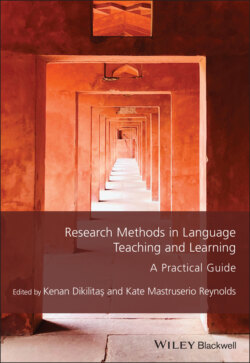Читать книгу Research Methods in Language Teaching and Learning - Группа авторов - Страница 20
Gaining Ethical Approval and Sampling
ОглавлениеAfter gaining permission to use an informed consent form, guaranteeing confidentiality, anonymity, and the right to withdraw at any time, I asked for volunteers in September 2003; 16 teachers responded positively. While none withdrew, I reduced the number I was focusing on to 12 then 10 then 6 throughout 2004 (and then to 5 in 2006 during the writing-up stage), but without signaling this process to the research participants, to avoid the risk of hurting feelings and/or reducing learning opportunities, given that I realized participating may have brought some benefits through the more extended interaction it afforded.
When making decisions about sampling, Stake (1995, p. 4) argues that “the first criterion should be to maximize what we can learn.” Indeed, I quickly realized in my research that participating teachers who were relaxed and engaged throughout, had interesting and revealing stories to tell, listened carefully, and were able to expand fluently in clear voices (easily picked up by the tape recorder) made very good interviewees. These were reasons to retain them. In contrast, a teacher who appeared to be suffering from mild interview fatigue was quickly dropped.
I also employed “purposive” and “theoretical” sampling (Silverman, 2010). Of these, “purposive sampling” requires us to “think critically about the parameters of the population we are studying and choose our sample cases carefully on this basis” (Silverman, 2010, p. 141). Through considering factors such as gender, school type (first or second cycle, single sex or mixed, following the new or old curriculum at a time of curriculum renewal) and location (town, rural or mountain village), I could focus on achieving some balance and variety (Stake, 1995).
“Theoretical” sampling, sampling on the basis of hypotheses (Silverman, 2010), was also crucial. One of my hypotheses was that growth in practical knowledge and TSE beliefs would be more evident in dimensions of the teachers’ work they cared about most, where they were focused on self-directed goals (Henson, 2001). Just over halfway through their three-year course, the teachers were asked to articulate goals explicitly when choosing research topics for their dissertations. As I had started with a wide focus (Nisbet & Watt, 1984) in the first research interviews, these topics were well represented in the data. For example, one teacher identified his main research interests in September 2004 as: motivation, group work, adapting materials, and assessment (in no particular order). In the previous year, I had elicited data from him relating to three of these topics, and his choice of dissertation then combined two. It seemed ecologically valid (Cohen et al., 2011) to align my focus with his, to concentrate on themes he was most interested in exploring for himself.
A second and related hypothesis that fed into the theoretical sampling (Silverman, 2010) was that teachers who were planning to research their own practice through conducting action research (Burns, 1999) might, through engaging in processes such as reflection and experimentation, experience the kind of growth in practical knowledge and TSE beliefs that I was particularly interested in investigating. My final selection was therefore of teachers who were planning action research. Implicit in the above hypothesis, however, was a further hypothesis, that the change that would occur was positive, that the BA TESOL would support teachers to become more learner-centered, with a somehow deeper “moral, affective and aesthetic way of knowing” (Golombek, 1998, p. 449). It seemed necessary to test this hypothesis by choosing “a deviant case” (Silverman, 2010), one that did not seem to be following that pattern, to gain a richer, deeper understanding of the theory. Considering this, I was conscious from observations and interviews conducted during the second year of the program that one of the teachers I was investigating was possibly not developing in the expected direction. This teacher was amongst those five finally retained.
